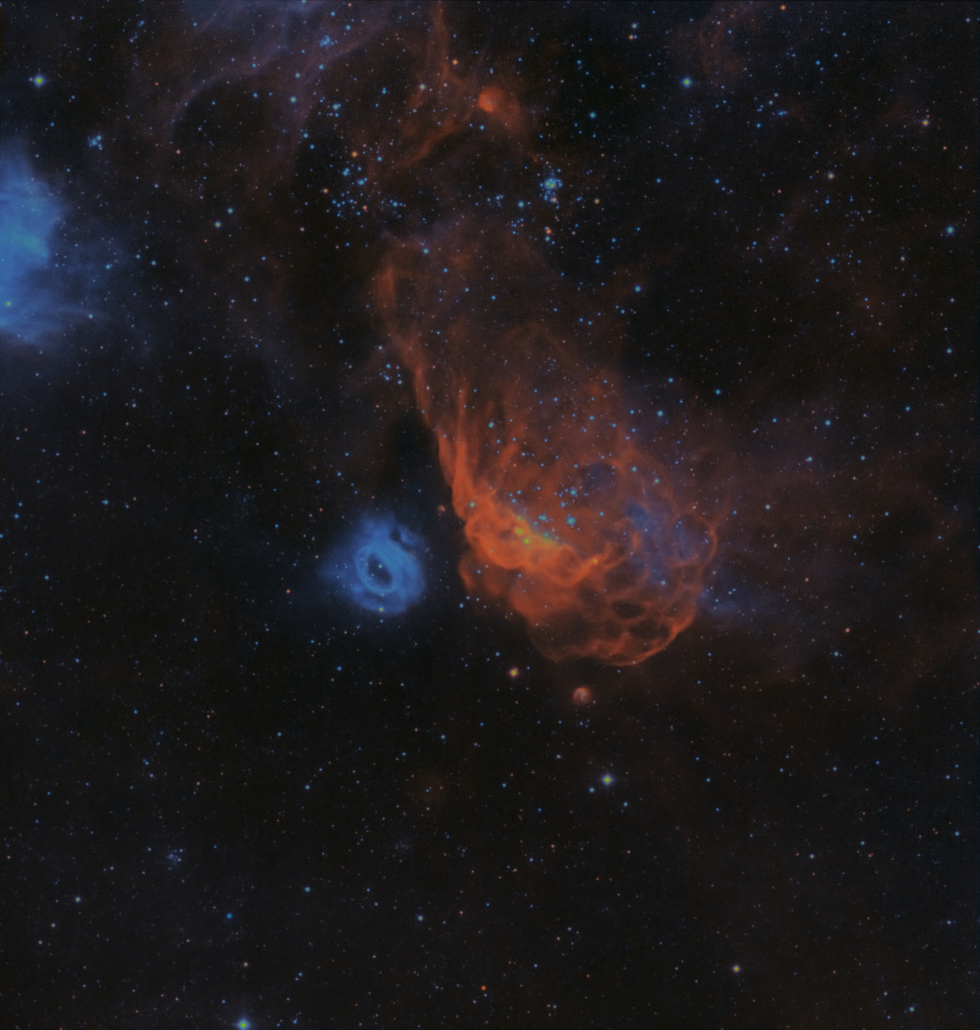NGC2014
NGC2014
The wonderfully beautiful nebula NGC2014.
The large, red nebula (NGC 2014) and its smaller blue neighbor (NGC 2020)
are part of a vast star-forming region in the Large Magellanic Cloud, a satellite
galaxy of the Milky Way.
The sparkling centerpiece of NGC 2014 is a grouping of bright, hefty stars,
each 10 to 20 times more massive than our Sun. The stars’ ultraviolet radiation
heats the surrounding dense gas. The massive stars also unleash fierce winds
of charged particles that blast away lower-density gas, forming the bubble-like
structures seen on the right.
The blue areas in NGC 2014 reveal the glow of oxygen, heated to nearly
20,000 degrees Fahrenheit by the blast of ultraviolet light. The cooler, red gas
indicates the presence of hydrogen and nitrogen.
By contrast, the seemingly isolated blue nebula at lower left (NGC 2020)
has been shaped by a solitary mammoth star. This young, massive star, called
a Wolf-Rayet, has ejected its outer layers of gas, exposing its searing-hot core,
making it roughly 200,000 times brighter than our Sun.
Star-forming regions generally last tens of millions of years. Star birth in this
region appears to have just started, with a robust episode of newly formed stars,
about 5 million years ago.
-text from NASA (https://www.nasa.gov/sites/default/files/atoms/files/ngc2014-ngc2020-tagged.pdf)-
I used the data provided in the Bundle, which is btw a good improvement on the previous version. I stacked it in DSS and edited in PIX and Affinity, going back and forth whenever I needed to do so. I'm not that good in PIX but I know my way around but for some stuff I still have to go to Affintity and I don't mind that at all.
I hope you like and see you ext time!
The large, red nebula (NGC 2014) and its smaller blue neighbor (NGC 2020)
are part of a vast star-forming region in the Large Magellanic Cloud, a satellite
galaxy of the Milky Way.
The sparkling centerpiece of NGC 2014 is a grouping of bright, hefty stars,
each 10 to 20 times more massive than our Sun. The stars’ ultraviolet radiation
heats the surrounding dense gas. The massive stars also unleash fierce winds
of charged particles that blast away lower-density gas, forming the bubble-like
structures seen on the right.
The blue areas in NGC 2014 reveal the glow of oxygen, heated to nearly
20,000 degrees Fahrenheit by the blast of ultraviolet light. The cooler, red gas
indicates the presence of hydrogen and nitrogen.
By contrast, the seemingly isolated blue nebula at lower left (NGC 2020)
has been shaped by a solitary mammoth star. This young, massive star, called
a Wolf-Rayet, has ejected its outer layers of gas, exposing its searing-hot core,
making it roughly 200,000 times brighter than our Sun.
Star-forming regions generally last tens of millions of years. Star birth in this
region appears to have just started, with a robust episode of newly formed stars,
about 5 million years ago.
-text from NASA (https://www.nasa.gov/sites/default/files/atoms/files/ngc2014-ngc2020-tagged.pdf)-
I used the data provided in the Bundle, which is btw a good improvement on the previous version. I stacked it in DSS and edited in PIX and Affinity, going back and forth whenever I needed to do so. I'm not that good in PIX but I know my way around but for some stuff I still have to go to Affintity and I don't mind that at all.
I hope you like and see you ext time!
SPECIFICATIONS
Telescope
CHI-1
Camera
FLI PL9000
Location
EL SAUCE OSERVATORY, CHILE
Date of observation
25,23,14 NOV / 25,15,7,4 OCT / 15,4 SEP / 30 AUG / 19 JUL
Filters
O3 3nm, S2 3nm, HA 3nm Astrodon
Processing
DSS/Pixinsight/Affinity
Credits
Thanks to all people of Telescope.Live
Comments
Hi Rune, there was a mistake in the Contests rules page, the tag for the bundle contest should be #BundleContestDec21. I've updated it for you.
Oh thanks!




